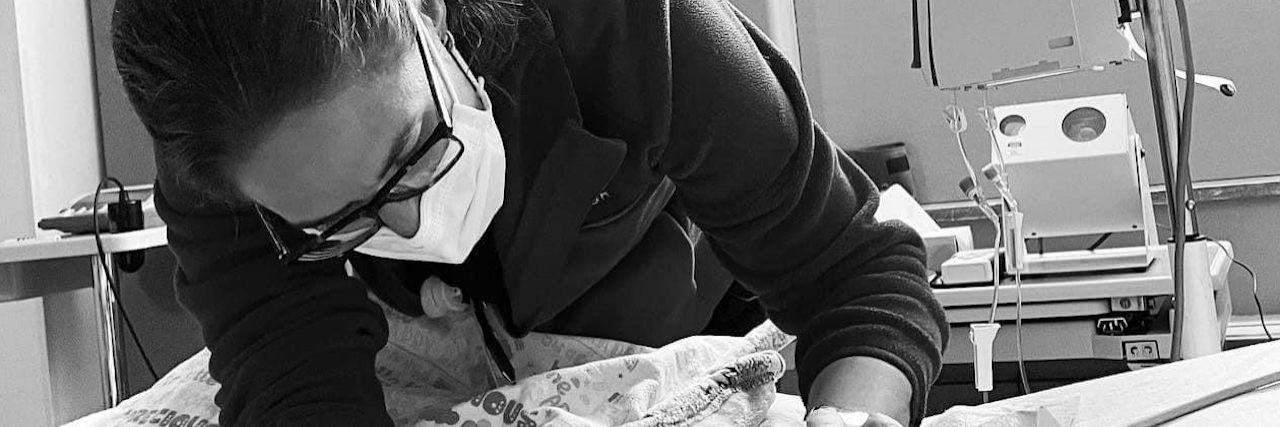I live on the edge of an uneasy truce with my immune system. Autoimmune arthritis, Sjogren’s syndrome, and inflammatory bowel disease mean I am a high utilizer of health care. I am also a physician, so I see both sides of the complex, fragmented, ever-changing, unmapped morass of U.S. health care. I want to share my experiences so you know two things: (1) You are not alone in struggling to get the care you need and (2) Your doctor is on your side.
One balmy February day, I awoke to the dry and gritty-feeling eyes, stiff and swollen joints, and searing belly pain that herald a full-on “flare” of my autoimmune disease. But it was Thursday, my clinic schedule was full, and I couldn’t imagine letting so many patients down if I canceled. Some had waited months to see me.
“Are you OK?” my assistant asked, as I doubled over in my chair, face pinched with pain. My symptoms intensified as the day progressed and during the last appointment, I had to excuse myself twice. My colleagues begged me to go to the emergency room, but I was scheduled to see my rheumatologist as soon as I was done doctoring for the day. When I got there, he took one look at me and said “You do not look good,” and he was right. I was in bad shape.
Two months before, at the earliest sign of trouble, he had prescribed weekly immunosuppressant medication, instead of every other week, trying to better control my disease. Unfortunately, my health insurer required a new prior authorization for the change in dosing frequency. For weeks I checked the approval status doggedly, sending messages through the electronic medical record (EMR) and calling the office. But my medication ran out before the new authorization came through.
By February, I had missed four doses and my disease was out of control. Both the rheumatologist and I knew what I needed, but the insurer held the cards. My options were grim: let my disease worsen while I waited out the insurer, load up my credit card to pay for the medication myself, or go to the emergency room for escalation in care, which I was loath to do. The ER made the most sense, but as I knew and my rheumatologist said, with a shrug, a sigh, and a downcast gaze, “We both know it will come with a cost.” He was right; I’m still fighting the nearly $14,000 bill.
My experience is a shockingly common one. A recent American Medical Association survey revealed that 94% of physicians reported prior authorization led to delays in patients accessing necessary care and 89% believed this led to negative impact on clinical outcomes. Physicians can regularly predict the result of such crises, yet are powerless to stop them. My rheumatologist was frustrated and crestfallen. His hands were tied at every turn and there weren’t enough hours in his day to fight this fight for each patient who deserved it. He and I both know insurance companies hope they won’t have to pay. They bank on patients and doctors giving up after a denial and, too often, they win. Only about 10% of cases are appealed when the initial prior authorization is denied. I’ve been on the other side of this situation and, for me, it’s also agony; watching my patients suffer, fighting tooth and nail for them, and knowing that too often, it isn’t enough.
Such scenarios have been described as moral injury, “simultaneously knowing what care patients need but being unable to provide it due to constraints that are beyond our control” — constraints like prior authorization requirements. Physicians are struggling to practice patient-centered medicine in a business model that allows payers to drive medical decision-making and delay medically necessary treatment. And it’s driving an unnecessary wedge in the physician-patient relationship.
Patients chafe at the delays caused by prior authorization, frustrated with their doctors’ inability to hurry the process, and frightened by the implications for their health. Physicians exasperate at their lack of autonomy and latitude to practice, the lack of respect by insurers for their expertise, and are anguished by their inability to relieve their patients’ suffering. Both doctors and patients want the same thing and are harmed in such situations, whether physically, emotionally, or financially. The system is breaking all of us.
So, what can we do? We can stand up and fight back — together. Most patients are surprised that doctors, who may seem so powerful and intimidating in the exam room, have relatively little power in health care systems. Their numbers are small (for every doctor there are 17 other jobs in health care) and the influence they once wielded now resides with administrators. In too many health systems, the good will of doctors is taken for granted. As Danielle Ofri put it in a New York Times article, clinicians’ commitment to their patients is the “very ethic that is being exploited every day to keep the enterprise afloat.” However, administrators care deeply about patient satisfaction because it matters to their reimbursement rates. More satisfied patients mean higher revenue for the health system.
This community of The Mighty has a strong history of advocacy. Banding together with physicians for change will be more successful than either community going at it alone. We can bravely share our stories and work together to raise awareness. We can choose to support health care systems that prioritize patient care when seeking health care and relentlessly offer feedback to those that do not. And together we can educate state and federal representatives to promote necessary changes to legislation and insurance reform. These are critical steps we all must take. The time to act is now, because health care is hard enough.
Image via contributor

